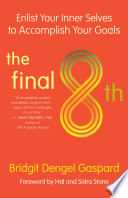“The Final 8th: Enlist Your Inner Selves to Accomplish Your Goals” addresses a common problem of being close to accomplishing a goal then not finishing it, but not because of lack of talent, experience or discipline. Bridgit Dengel Gaspard’s book explains why this could happen and how to overcome this problem.
Gaspard suffered from this phenomenon and coined the term “The Final 8th” to describe how people choke close to the finish line. While it is a universally relatable experience, escaping it is not. Gaspard’s book solves a common problem, which makes it required reading. Gaspard proposes that anyone, including the reader, could engage in vocal dialogue, to resolve the problem. If you have never heard of vocal dialogue, “The Final 8th” does a superb job of describing it, showing it in quotes from actual sessions then providing exercises that the reader can use to do their own vocal dialogue session at home.
Drs. Hal and Sidra Stone developed vocal dialogue and endorsed Gaspard’s work in the foreword. The idea behind vocal dialogue is that each person consists of multiple roles such as the Inner Critic, the Competitor, etc., and some of these roles are encouraged as they are growing up while the others remain hidden but can never be eliminated so they act behind the scenes to protect themselves. Because we are not always conscious of how these roles and their interactions affect our actions, but they do, we find ourselves stuck with “The Final 8th” problem. To eliminate that problem, vocal dialogue is proposed to get to know these parts of ourselves. I have no idea if it is like shadow work. In vocal dialogue you need a little space to change your position-a seat for you and a seat for the role that you will put in the driver’s seat. Even though it is a short book, it outlines exercises in voice dialogue so your persona has something to talk about, and you are supposed to record your responses to review afterwards.
“The Final 8th” is the kind of book that you do not want to rush through. If it feels repetitive, you may have inadvertently done so. Though many of the exercises are similar, they are illustrating different reasons that the reader could be stalled in their endeavors. It may be a good idea to reread the book. The examples of dialogue feel relatable and universal: relationships, diets, work. It also helps that Gaspard is vulnerable by sharing her own struggles with success, which was not overnight. Maybe being a performer helped her to get comfortable with delving into her personal history to support her professional life.
You get what you put into “The Final 8th.” It may be a good idea to get a notebook or paper so you can do the exercises as you read it, but for those who find that too cumbersome, you can record yourself on your smartphone. For the book to be effective, the reader must engage with it. Like many self-help books, they work proportional to the reader’s effort, but effort is never enough. Once I did the exercises, I never want back to them. Maybe I should have? I also did not move around because first, I am a brain then a body so most physical movement that is not instinctual feels self-conscious and awkward. I sabotaged myself again!
“The Final 8th” may be the best introduction to the concept. For readers like me who do follow the book’s instructions, reading the book and completing the exercises are not the same as incorporating it into a part of daily practice. Gaspard helps readers apply the book’s concepts in different ways by offering alternatives to solely reading. Every third Thursday, she hosts a Zoom Learning Lab, which I have never had the opportunity to try because of prior commitments. There is also an online video tutorial on udemy, which I have rushed through. For me, the paperback version was the one that appealed the most, and I would not mind finding a local or virtual individual session without other people involved except for the licensed clinical social worker who is acting as the facilitator. I am in a ton of final 8th projects. Solo practice may not be enough to make it to the finish line. Maybe I’m suffering from the same problem while reading the book, which I did finish.
The most exciting part of “The Final 8th” is not just reaching a goal, but using the inner selves to get advice that we may seek from other people who are incapable of knowing us as the individual and their inner selves are. I like the idea of knowing and making peace with yourselves and not judging or suppressing them. Gaspard distinguishes this technique from dissociative identity disorder, aka this modality does not encourage people to model themselves after popular figures in media like Eve or Sybil. A concept that Gaspard discusses more in interviews than in the book is that if some of these selves were formed as a kid and are not as mature as the rest of you, you do not want them secretly making decisions so bringing them to the forefront ensures that they get used appropriately. In addition, one can cultivate or develop new aspects of yourself to be more engaging and outgoing.
I really enjoyed “The Final 8th” and am debating about trying to find a facilitator to overcome the limits that I discovered while reading.





